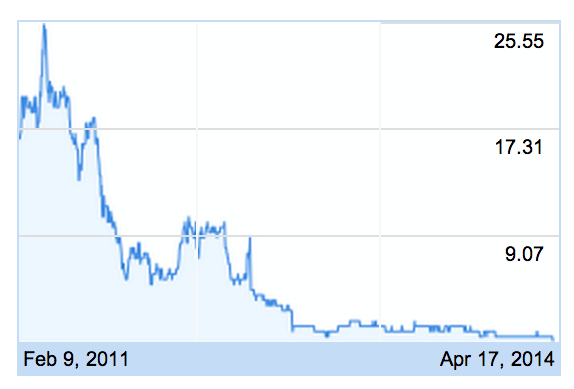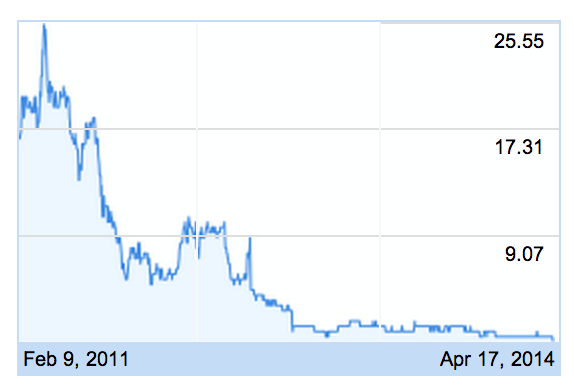As the blog reported before, 2014 seems to be the year for industry restructuring with LS9 being acquired by Renewable Energy Group; Cereplast filing for bankruptcy and Codexis changing its business strategy and focus.
Bio-isobutanol producer, Gevo, is currently in the cross-hair unless the company comes up with more cash this year. Gevo recently warned on its recently filed Form 10-K with the SEC (Securities and Exchange Commission) that as of December 31, 2013, it has only about $24.6 million on its cash and cash equivalents reserves, and that based on its operating plan, this is not sufficient to meet the cash requirements to fund planned operations through December 31, 2014, without additional sources of cash.
The company noted that “these conditions raise substantial doubt its ability to continue as a going concern.”
As of December 31, the company had an accumulated deficit of $262.2 million and is expected to further incur losses and negative cash flow from operating activities for the foreseeable future as revenues from the sale of isobutanol and related products have been limited. On a consolidated basis, Gevo had approximately $11.1 million in aggregate principal amount of secured indebtedness outstanding as of December 31.
The company’s current cash reserves is currently being used for operating activities and startup production of isobutanol at its Agri-Energy facility in Luverne, Minnesota; R&D work; capital improvements with the facility; optimizing isobutanol production technology; costs associated with the ongoing litigation with Butamax; and debt service obligations.
Up through December 31, 2013, Gevo have incurred capital costs of $65.7 million on the Retrofit of the Agri-Energy Facility – still a lower investment cost compared to a greenfield plant. The plant has the capability to produce 23m gal/year ethanol or 18m gal/year isobutanol.
The company said it intends to fund future operations through additional private and/or public offerings of debt or equity securities. Gevo’s stock price continued to plunge down since it reached a high of $26/share in early 2011, and the stock has recently reached 93 cents/share as of market closing on April 17.
Gevo’s stocks took a major hit in 2012 when it encountered production challenges, including contamination issues, which have resulted in lower than planned isobutanol production. The facility started operations in May 2012. Since then, isobutanol production has been limited and the facility has yet to produce commercial isobutanol volumes at nameplate production levels. The company admitted that it has very limited experience operating commercial-scale ethanol and isobutanol facilities. But then again, this production technology is also new to the chemical and biofuel industry, and production hiccups should be expected.
The facility’s startup runs during the first half of 2013 were primarily focused on producing isobutanol from dextrose (sugar), and then production was halted in the second half of the year. In October last year, the company commissioned the facility on using the less costly corn mash. In March this year, Gevo decided to modify the facility to enable the simultaneous production of isobutanol and ethanol to maximize site cash flows, while taking advantage of the current strong ethanol margins.
As of April 15, Gevo has not yet transitioned back to ethanol production. One industry analyst expects ethanol production to commence in mid-May. However, it is expected to tail off next year as isobutanol production ramps up in the first half of 2015.
Gevo do need to meet certain volume demands/customer requirements for isobutanol this year including several supply/distribution agreements that it has entered into. For example it has to pay Sasol shortfall fees if the company is not able to supply Sasol with certain minimum quantities of isobutanol, which will be used as solvents.
By May 31, 2014, Gevo also has to refund Toray with $1 million, if Gevo has not been able to produce and deliver a minimum quantity of isobutanol-based paraxylene by April 30, 2014. Gevo said it anticipates shipment of bio-PX this month produced from the toll manufacturing facility in Silsbee, Texas, owned and operated by South Hampton Resources.
Last month, Gevo has recently signed a letter of intent to exclusively license its GIFT technology in Argentina to ethanol producer, Porta Hinos S.A. Half of all current ethanol plants in Argentina were designed by Porta.
Gevo currently has another retrofit project in-the-making with Redfield Energy LLC for its 50m gal/y ethanol facility in Redfield, South Dakota. Gevo will be responsible for all the costs associated with the retrofit, and has already incurred $400,000 in planning-related costs, such as project engineering and permits. Gevo will require to raise additional debt or equity capital to retrofit the facility, although the company said it is not obligated to retrofit the facility. The companies had the JV agreement since June 2011.
Using a factored estimate based on the detailed design of the Agri-Energy Facility, Gevo estimates future base retrofit costs to convert an existing grain ethanol plant’s production capacity to isobutanol production capacity to be $1/gal of existing annual ethanol capacity. This projection translates to approximately $50 million for a 50 MGPY ethanol facility and approximately $100 million for a 100 MGPY ethanol facility. Gevo said these projected Retrofit capital expenditures are less than estimates for new plant construction for the production of advanced biofuels, including cellulosic ethanol.
Last but not the least, Gevo has also entered into a non-binding collaborative agreement with the Malaysian government’s East Coast Economic Region Development Council, Malaysian Biotechnology Corporation and the State Government of Terengganu with the intent to develop a cellulosic biomass isobutanol facility in Southeast Asia.





